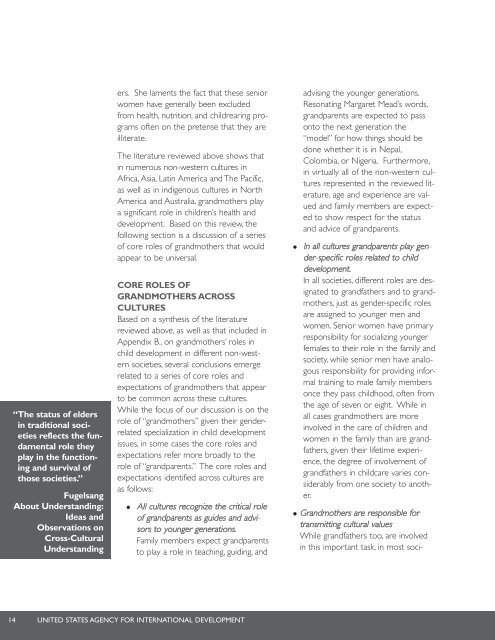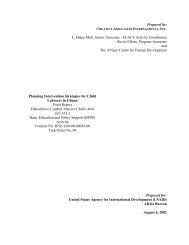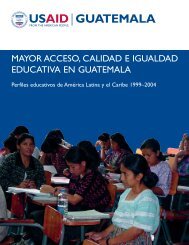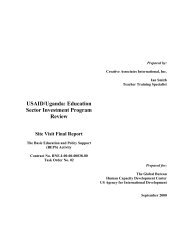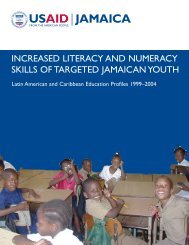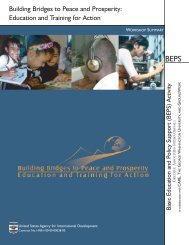Grandmothers: A Learning Institution - Basic Education and Policy ...
Grandmothers: A Learning Institution - Basic Education and Policy ...
Grandmothers: A Learning Institution - Basic Education and Policy ...
- No tags were found...
Create successful ePaper yourself
Turn your PDF publications into a flip-book with our unique Google optimized e-Paper software.
“The status of eldersin traditional societiesreflects the fundamentalrole theyplay in the functioning<strong>and</strong> survival ofthose societies.”FugelsangAbout Underst<strong>and</strong>ing:Ideas <strong>and</strong>Observations onCross-CulturalUnderst<strong>and</strong>ingers. She laments the fact that these seniorwomen have generally been excludedfrom health, nutrition, <strong>and</strong> childrearing programsoften on the pretense that they areilliterate.The literature reviewed above shows thatin numerous non-western cultures inAfrica, Asia, Latin America <strong>and</strong> The Pacific,as well as in indigenous cultures in NorthAmerica <strong>and</strong> Australia, gr<strong>and</strong>mothers playa significant role in children’s health <strong>and</strong>development. Based on this review, thefollowing section is a discussion of a seriesof core roles of gr<strong>and</strong>mothers that wouldappear to be universal.CORE ROLES OFGRANDMOTHERS ACROSSCULTURESBased on a synthesis of the literaturereviewed above, as well as that included inAppendix B., on gr<strong>and</strong>mothers’ roles inchild development in different non-westernsocieties, several conclusions emergerelated to a series of core roles <strong>and</strong>expectations of gr<strong>and</strong>mothers that appearto be common across these cultures.While the focus of our discussion is on therole of “gr<strong>and</strong>mothers” given their genderrelatedspecialization in child developmentissues, in some cases the core roles <strong>and</strong>expectations refer more broadly to therole of “gr<strong>and</strong>parents.” The core roles <strong>and</strong>expectations identified across cultures areas follows:• All cultures recognize the critical roleof gr<strong>and</strong>parents as guides <strong>and</strong> advisorsto younger generations.Family members expect gr<strong>and</strong>parentsto play a role in teaching, guiding, <strong>and</strong>advising the younger generations.Resonating Margaret Mead’s words,gr<strong>and</strong>parents are expected to passonto the next generation the“model” for how things should bedone whether it is in Nepal,Colombia, or Nigeria. Furthermore,in virtually all of the non-western culturesrepresented in the reviewed literature,age <strong>and</strong> experience are valued<strong>and</strong> family members are expectedto show respect for the status<strong>and</strong> advice of gr<strong>and</strong>parents.• In all cultures gr<strong>and</strong>parents play gender-specificroles related to childdevelopment.In all societies, different roles are designatedto gr<strong>and</strong>fathers <strong>and</strong> to gr<strong>and</strong>mothers,just as gender-specific rolesare assigned to younger men <strong>and</strong>women. Senior women have primaryresponsibility for socializing youngerfemales to their role in the family <strong>and</strong>society, while senior men have analogousresponsibility for providing informaltraining to male family membersonce they pass childhood, often fromthe age of seven or eight. While inall cases gr<strong>and</strong>mothers are moreinvolved in the care of children <strong>and</strong>women in the family than are gr<strong>and</strong>fathers,given their lifetime experience,the degree of involvement ofgr<strong>and</strong>fathers in childcare varies considerablyfrom one society to another.• <strong>Gr<strong>and</strong>mothers</strong> are responsible fortransmitting cultural valuesWhile gr<strong>and</strong>fathers too, are involvedin this important task, in most soci14 UNITED STATES AGENCY FOR INTERNATIONAL DEVELOPMENT


